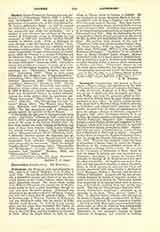

Davenport, CHRISTOPHER, also known as FRANCISCUS A SANCTA CLARA and sometimes by the alias of FRANCIS HUNT and FRANCIS COVENTRY, theologian, b. 1598, at Coventry, England; d. May 31, 1680. He was the son of Alderman John Davenport and Elizabeth Wolley, and from the grammar school at Coventry went to Dublin where he spent fifteen months, leaving it November 22, 1611. In 1613 he and his brother John proceeded to Merton College, Oxford, entering as “battelers” and taking Cook’s commons; but the warden required them to enter as commoners or to leave the college; whereon in 1614 they migrated to Magdalen Hall. Here Christopher became B. A. on May 28, his Dublin residence being allowed to count. (Oxford University Register.) John subsequently became a noted Puritan divine and emigrated to New England, where with a band of colonists he founded the city of New Haven, Connecticut (1638). Christopher was converted to Catholicism by a priest living near Oxford and in 1615 went to Douay. Attracted by the efforts to restore the English Franciscan Province, he joined the Flemish Franciscans at Ypres, October 7, 1617. When he was professed (under the name of Franciscus a Sancta Clara) he joined the English Recollects at the newly-established convent of St. Bonaventure at Douay (October 18, 1618). He was sent to the University of Salamanca in Spain, where he took his degree in divinity and won reputation as a theologian. Returning to Douay, he became first professor of theology at St. Bonaventure’s and filled the office of guardian. At length he was sent to England and was appointed chaplain to Queen Henrietta Maria, in which capacity he attended the Court and became acquainted with King Charles I, Archbishop Laud, Montague, Bishop of Norwich, and Goodman, Bishop of Gloucester. Inspired with the idea of converting England by means of corporate reunion, he wrote a treatise to show that the Thirty-nine Articles were susceptible of an interpretation more in accordance with Catholic teaching than was usually supposed. This was the “Paraphrastica Expositio Articulorum Confessionis Anglicanue”, published as an appendix to his book, “Deus, Natura, Gratia”, in 1634. It offended many Catholics and was put on the Index in Spain, though a condemnation at Rome was averted by Pan2ani, the pope’s nuncio in London.
On June 19, 1637, Davenport was elected provincial of the order, an office to which he was subsequently reelected, July 10, 1650, and June 4, 1665. After the Restoration he was appointed chaplain to Queen Catharine of Braganza, and returned to London, where he spent most of his remaining years, with occasional visits to Flanders. His intellectual ability and attractive manner won for him the friendship of many, and aided in reconciling numerous converts, among whom was Anne, Duchess of York. He lived to celebrate three jubilees—of religious profession, of the priesthood, and of the mission. His works are: “Epistolium, continens confutationem duarum propositionum astrologicarum” (Douay, 1626); “Deus, Natura, Gratia”, with the important appendix described above (Lyons, 1634); “Apologia Episcoporum” (Cologne, 1640); “The Practice of the Presence of God” (Douay, 1642); “Systema Fidei” (Liege, 1648); “De Definibilitate Controversiae Immaculatae Conceptionis Dei Genitricis Opusculum” (Douay, 1651); “Paralipomena Philosophica de Mundo Peripatetico” (Antwerp, 1652); “An Enchiridion of Faith” (Douay, 1655); “Explanation of the Catholic Belief” (1656); “Manuale Missionariorum Regularium praecipue Anglorum Ordinis Sancti Francisci” (Douay, 1658, 1661); “Fragmenta: seu Historia Minor. Provinc. Angl. Fratrum Minorum”; “Tractatus de Schismate priesertim Anglican”; “Vindication of Roman Catholics” (1659); “Liber Dialogorum” (Douay, 1661); “Problemata Scholastica et controversialia speculativa”; “Corollarium Dialogi de Medio Animarum Statu”; “Religio Philosophia Peripati discutienda” (Douay, 1662, 1667); “Opera omnia Francisci a S. Clara” (Douay, 1665-1667); “Disputatio de antiqua Provinciae Praecedentia” (1670); “Supplementum Historiae Provinciae Anglice” (Douay, 1671).
EDWIN BURTON

